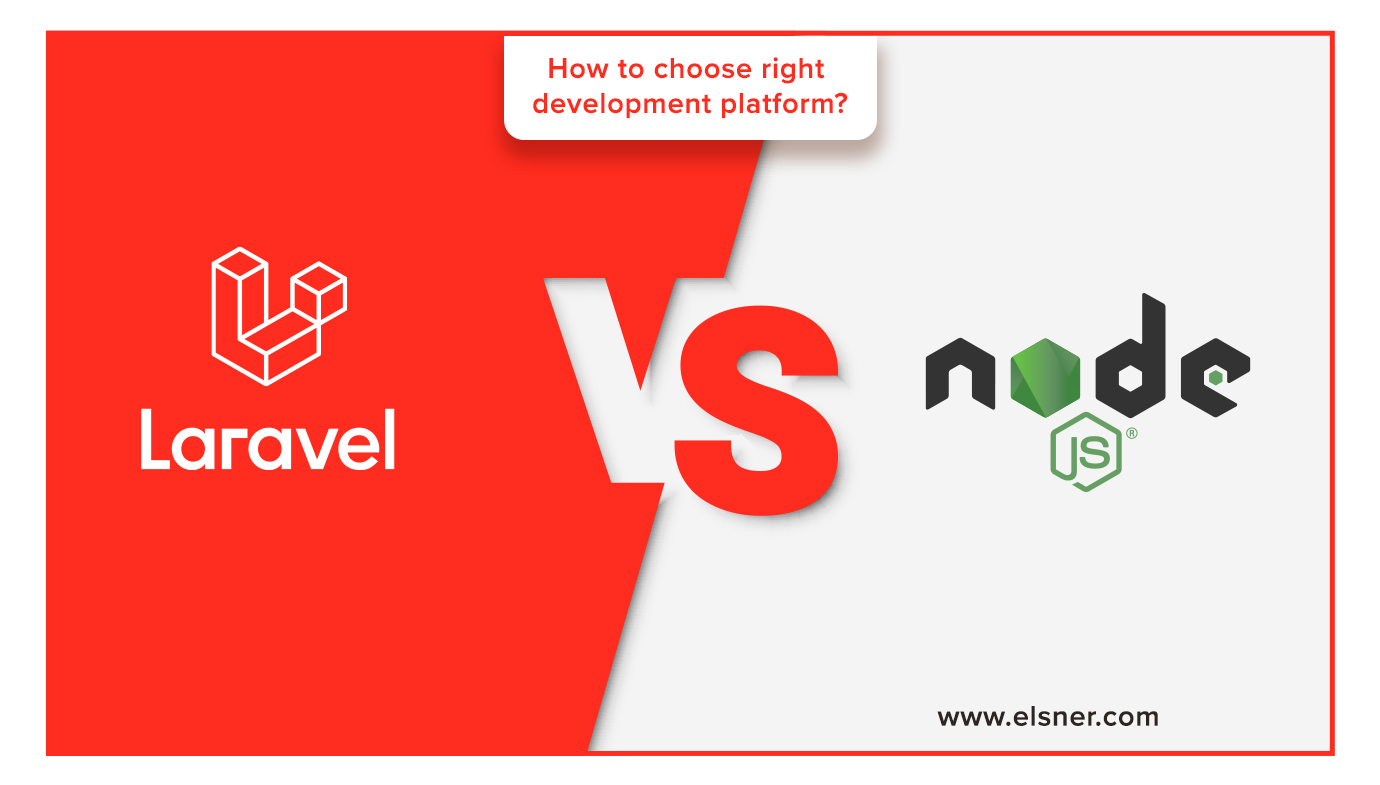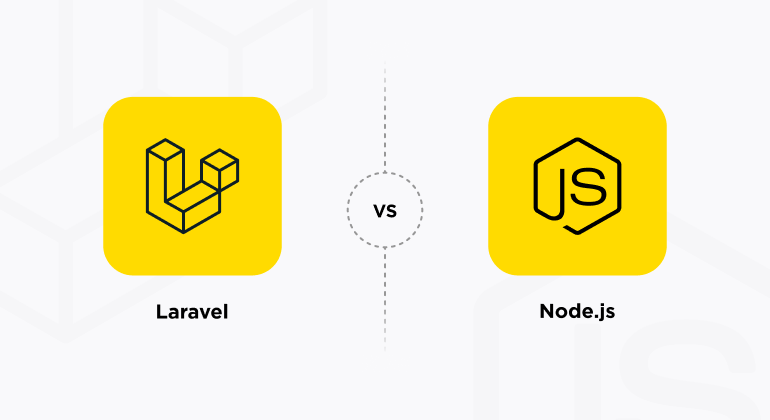Are you looking for effective web development technology? With modern developers, it becomes confusing when it is about Laravel vs NodeJS development.
We will discuss each platform’s uses, pros, and cons to make your decisions smarter.
What is Laravel?
Being a free and open-source PHP web framework for web application development. It follows the Model-View-Controller (MVC) architectural pattern and is designed to make tasks such as routing, authentication, and caching easier for developers.
The platform has a variety of compatible packages and extensions to streamline the development process. Also, it has powerful database tools to ensure smooth management and access for the developers. It has a set of code libraries with pre-programmed functionalities like rooting tools, HTML templates, or authentication tools to build apps faster.
What is NodeJS?
Node.js is a JavaScript runtime built on Chrome’s V8 JavaScript engine. The developers will help to build frontend and backend applications using JavaScript. Being an open-source code, it is readily available to developers.
The best part is that it is not dependent on the operating system, which means it can work on Linux, Windows, or macOS. Being a JavaScript runtime environment, the code won’t be performed until the task is executed.
Detailed Comparison: Laravel vs NodeJS
[Source: https://bit.ly/3D7xLIG]
Both NodeJS Development and Laravel have their strengths and weaknesses. Node.js is known for its fast performance and ability to handle many concurrent connections, making it perfect for real-time applications like chat or gaming. Laravel, on the other hand, is known for its elegant syntax and built-in tools for common web application tasks, such as routing, authentication, and caching.
Let us look at some of the important factors:
1. Structure and flexibility:
The efficiency of a programming language depends on the structure of the platform. Let us look at both platforms:
- Laravel: It is a PHP based framework that separates the business logic and presentation to boost performance. The controller functions to build a bridge to handle all the requests, connect the model to retrieve collected information, and transmit the information to views.
- NodeJS: This single-threaded event loop design differs from the request and response techniques using multiple threads. It sends blocking and non-blocking requests to the platform. The platform serves and returns a response for single requests without external authorization.
2. Scalability and Growth:
The ability of the system to manage a higher volume of work. The system must interact with the users and handle tasks efficiently. Growth of both platforms are:
- Laravel: There are several threads to process the requests. The platform performs additional computational effort to maintain scalability and serve requests. Developers can balance the HTTP requests.
- NodeJS: A single-threaded event loop architecture that makes the platform highly scalable. This has gained attention from the developers as a strong development tool. It has an asynchronous operation that makes it effortless to handle complicated tasks.
3. Ease of Learning:
Understanding the development tool’s learning curve and the necessity to bring better solutions is important. Let us focus on the platform:
- Laravel: It is known to have a steep curve for developers. They must have a basic knowledge of PHP, HTML, and CSS. It has templates and preloaded resources to boost the web app development process with the help of essential functionalities.
- NodeJS: The platform is easy to learn if you have JavaScript experience. In fact, brushing up on Node.js interview questions is particularly helpful in clearing concepts when preparing for a developer role. It is easier to unlock the architecture, making its development effortless.
4. Performance:
As a business owner, you must understand various traits for business to boost the platform’s performance.
- Laravel: It has a rigid architecture that handles simple and complicated tasks in the application with great efficiency. Laravel also offers good performance, but it might not be as good as Node.js in terms of real-time, high-performance web applications
- NodeJS: It is built on the V8 JavaScript engine, which is highly optimized for performance. It uses an event-driven, non-blocking I/O model, which makes it well-suited for building real-time, high-performance web applications.
5. Community and Support:
- Laravel: It has a large and active community, which means it has many packages and resources for developers.
- NodeJS: This also has a large and active community, but it has been around longer than Laravel.
6. Development experience:
- NodeJS: It has a large and active community, and developers can leverage a wide range of pre-built packages and modules.
- Laravel: This also has a large and active community and offers built-in tools for common tasks, such as routing, authentication, and validation.
7. Use cases:
- NodeJS: It is commonly used to build backend services, such as APIs, web sockets, and full-stack JavaScript development.
- Laravel: It is often used for building traditional web applications, such as e-commerce sites, content management systems, and forums.
Node.js and Laravel are both powerful and popular choices for web development, but they have different characteristics and use cases. Node.js is suitable for building real-time, high-performance network applications, while Laravel is suitable for building traditional web applications and following MVC architecture.
What are the Pros and Cons of Laravel vs NodeJS Development?
Here are some important pros and cons of using Laravel for web development:Pros:
- Elegant Syntax: Laravel offers an elegant and expressive syntax, making it easy to read and understand the code.
- Built-in tools: Laravel offers built-in tools for common tasks such as routing, authentication, and validation, saving developers a lot of time and effort.
- Modularity: Laravel follows a modular structure, which makes it easy to manage and maintain large and complex codebases.
- MVC architecture: Laravel follows the Model-View-Controller (MVC) architecture pattern, which clarifies concerns and makes it easy to organize and manage the code.
- Large and active community: Laravel has a large and active community so that developers can leverage a wide range of pre-built packages and modules.
Cons:
- Steep Learning Curve: Laravel has a steeper learning curve, as developers need to understand PHP and web development concepts, such as MVC and ORM.
- Performance: Laravel is not as fast as Node.js, particularly when handling many concurrent connections.
- Dependence on PHP: Laravel is written in PHP, requiring the PHP runtime to be installed, which can be an issue for some developers.
- Limited support for certain applications: Laravel is not well-suited for building certain types of applications, such as real-time applications requiring high performance.
In summary, Laravel is a powerful and elegant framework for web development, but it has its limitations. It’s great for building traditional web applications and easy to use if you are familiar with PHP. However, it can be challenging for new developers, and it’s not well-suited for certain types of applications
Here are some noteworthy pros and cons of using Node.js for web development:
Pros:
- High performance: Node.js deals with event-driven and non-blocking I/O models, which makes it highly lightweight and efficient. This makes it well-suited for building real-time, high-performance network applications.
- Full-stack JavaScript: Node.js allows developers to write both the frontend and backend of an application in JavaScript, which can make for a more seamless development experience.
- Large and active community: Node.js has a large and active community, so developers can leverage a wide range of pre-built packages and modules.
- Scalability: Node.js is highly scalable, and it can manage a large number of concurrent connections.
Cons:
- Asynchronous programming model: Node.js uses an asynchronous programming model, which can be challenging for new developers to understand and can make debugging more difficult.
- Limited support for multi-threading: Node.js does not support multi-threading, which can be an issue when building certain types of applications.
- V8 Garbage Collection: Node.js’s V8 garbage collector can cause performance issues in case of high memory usage.
- Limited support for certain applications: Node.js is not well-suited for building certain types of applications, such as CPU-intensive applications or applications requiring native system access.
NodeJS is a powerful and flexible platform for web development, but it has its limitations. It’s great for building real-time, high-performance network applications and is easy to use if you are familiar with JavaScript. However, it can be challenging for new developers and is not well-suited for certain applications.
Conclusion
NodeJS development is a JavaScript runtime that helps developers to run on the server side using JavaScript, making it suitable for building real-time, high-performance network applications. It is lightweight and efficient and uses an event-driven, non-blocking I/O model. It is often used for creating backend services, such as APIs and web sockets, and for full-stack JavaScript development.
Laravel, on the other hand, is a PHP web application framework designed for web artisans. It offers an elegant syntax, built-in tools for common tasks, and a modular structure that makes it easy to build robust web applications. Laravel development follows the Model-View-Controller (MVC) architecture pattern, which clarifies concerns and makes it easy to manage large and complex codebases. Laravel is often used for building traditional web applications, such as e-commerce sites, content management systems, and forums.
It’s difficult to directly compare Laravel and Node.js, as they serve different purposes. Laravel is a framework for building web applications with PHP, while Node.js is a runtime for running JavaScript on the server side. Ultimately, the best choice will depend on your specific needs and preferences.

About Author
Pankaj Sakariya - Delivery Manager
Pankaj is a results-driven professional with a track record of successfully managing high-impact projects. His ability to balance client expectations with operational excellence makes him an invaluable asset. Pankaj is committed to ensuring smooth delivery and exceeding client expectations, with a strong focus on quality and team collaboration.





